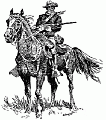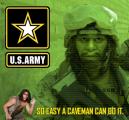Of course IO is larger than me and larger than PSYOP, no one ever said it wasnt, its also larger than the entire DoD, and frankly, larger than America.
The notion that the average hard power rifleman does more to win the War of Ideas than anyone else is unsupported, and not contended in the links you provided. We are in an ideological struggle with Islamist militantism, and riflemen are not going to solve that conflict. Everyone from Bush, to Rice, to Petraeus has acknowledged this. We're talking about the War of Ideas here, not the ground operations that rely on IO, Influence Ops (more than Info Ops) to achieve their military goals.
The fact is that a national level organization worked in the past, and current experts unanimously support the notion, but have been unable ot generate the political will to create it. The OSI was shut down not because it was useless, but because it created too much popular opposition to be effective.
What is discussed on the SWJ bboard hardly trumps the ongoing and dedicated efforts at RAND, USAWC, and academic instutitons all across the Western world.
Cragin, Kim and Gerwehr, Scott. Dissuading Terror: Strategic Influence and the Struggle Against Terrorism. Santa Monica, CA: RAND, 2005
Gough, Susan L. “The Evolution of Strategic Influence” USAWC Strategy Research Project, 2003
Schleifer, Ron. Psychological Warfare in the Intifada: Israeli and Palestinian Media Politics and Military Strategies. Portland, Ore.: Sussex Academic, 2006.
Ward, Brad M. “Strategic Influence Operations – the Information Connection” USAWC Strategy Research Project, 2003
Phares, Walid. The War of Ideas: Jihad Against Democracy. New York: Palgrave Macmillan, 2007.
Radvanyi, Janos. Psychological Operations and Political Warfare in Long Term Strategic Planning. New York: Praeger, 1990
Rosnau, William. “Waging the 'War of Ideas'” RAND Reprint, 2006
You can read the RAND stuff here:
http://www.rand.org/pubs/reprints/2006/RAND_RP1218.pdf (accessed December 2nd, 2008)
http://www.rand.org/pubs/monographs/2005/RAND_MG184.pdf
As you can see, the issue that you took exception to (a centralized organization), is universally accepted. Now if you can provide examples of social science research contradicting this conclusion, I would be very interested in reading them. I'm always open to being proven wrong.











Bookmarks